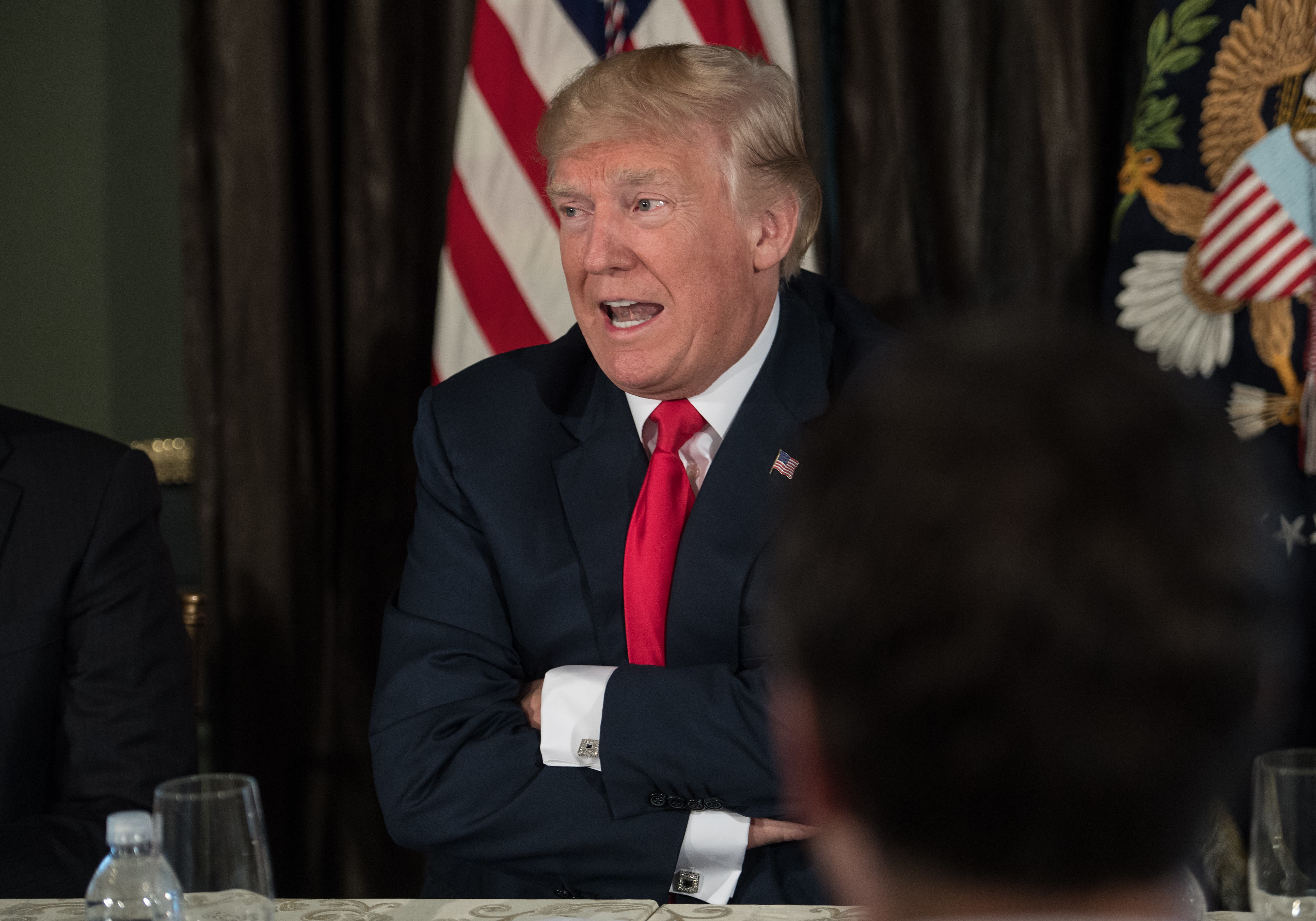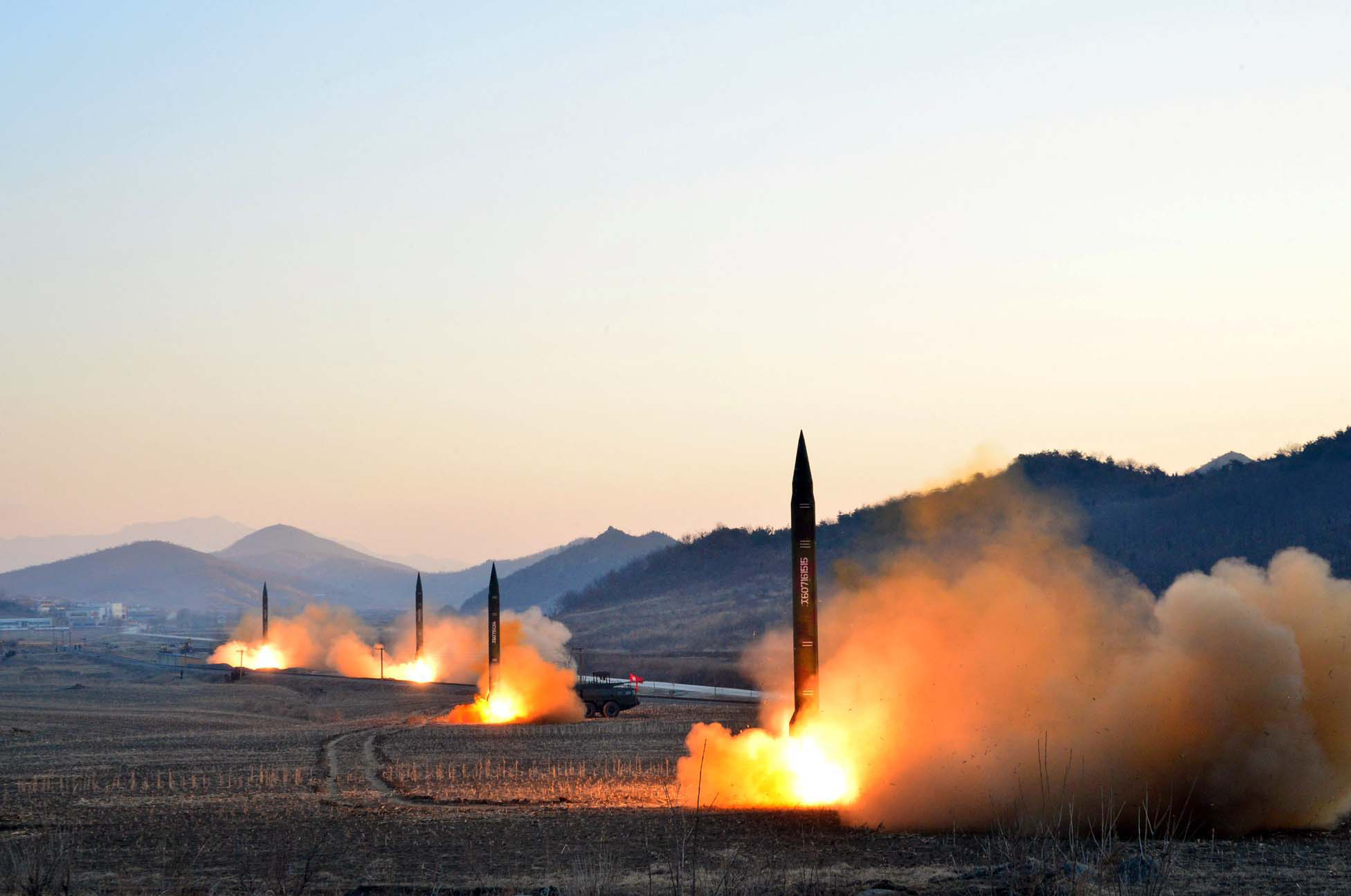
(Photo: Nicholas Kamm/AFP/Getty Images)
Tensions between the United States and North Korea flared on Tuesday, with a heated back and forth of threatening statements between Washington and Pyongyang. In response to a statement by North Korea promising to take “physical action” against the U.S., President Donald Trump told reporters that any further threats would be met with “fire and fury,” the New York Times reports. North Korea’s initial threat came in response to new sanctions imposed by the United Nations Security Council over the weekend. According to Reuters, North Korea’s state-run media reported later on Tuesday that North Korea is considering a plan to fire missiles at Guam, a U.S. territory.
To help make sense of this rhetorical and diplomatic fire and fury, Pacific Standard spoke to Steven Weber, a political scientist specializing in national security at the University of California–Berkeley, who has long been following the strategic relations between North Korea and the U.S. Weber prefaced his expertise with the disclaimer: “Anybody in the United States who claims to be a North Korea expert is probably over-claiming.”

Is the “fire and fury” all sound and fury? Is there a real threat of nuclear bombing for either country or is this all bluster?
This kind of escalatory rhetoric makes everybody anxious, and it’s designed to do that, but I don’t think it significantly increases the risk of war. Everybody knows on both sides that there’s only losers in a war of this sort; the only question is who loses more. I think it’s clear to everybody that a few really bad things would happen if there was an all-out war on the Korean peninsula: probably most of Seoul would be devastated, ultimately the North Koreans would lose the war, Korea would be reunited. In the interim, how much devastation would occur? Who knows. But this is all posturing—not Donald Trump and Kim Jong Un posturing toward each other, but both of them posturing toward the Chinese.
Why is China so central to this diplomatic tangle?
The Trump administration understands that if they want a freeze or even a rollback of North Korea’s nuclear program, their only shot in hell of getting that outcome involves pressure from the Chinese, really clamping down on North Korean imports and exports and North Korean counterfeits. So they need the Chinese. The North Koreans know perfectly well that, without Chinese support, the regime and the country wouldn’t survive very well at all. The economy would collapse. The Chinese are the key, and everybody knows this. And the Chinese sort of like it that way. For the moment, everybody is appealing to try to get the Chinese on their side.
How does this posturing of threats appeal to the Chinese?
If six months ago, you had a pot on the stove, and it was at 110 degrees, it was lukewarm. Now the pot is at 140-150 degrees. Nobody wants the pot to boil, but rhetoric like this says to the Chinese, “I’m willing to turn the temperature up, increase the risk that this thing is going to turn into a boil.” It’s an escalation in risk-taking. And at that point, you’d think that the Chinese would have the sense to say: “Whoa! Everybody take a step back here. We’re going to set the terms on how this brewing crisis is going to come to an end.”
And I think what the Trump is essentially telling the Chinese: “Look, we’re really serious about this. Prior administrations said a lot of things about how they weren’t going to allow North Korea to become a nuclear state, but they weren’t really serious about it. We’re deadly serious about it. And if you guys don’t take steps to restrain your ally, who knows what could happen?”

(Photo: University of California–Berkeley)
But wasn’t Trump’s message a response to the turning up of the heat by the North Koreans with their own threatening statement that preceded his?
It’s hard to know who has been responding to whom at this point. This dance has been going on for 20 years. The United States led a vote for sanctions at the U.N. [this weekend], and then the North Koreans responded with some of their typical rhetoric: “We’re going to use ‘physical resources.'”
We’re past the point of asking who’s provoking whom. The question is, what’s the response? Everybody’s responding to each other at this point, but it’s all theater for the Chinese.
Can you explain the sanctions that the U.N. imposed this weekend?
The sense is the new sanctions are even more severe than the current sanctions regime, which is pretty severe itself. But the Chinese look the other way, in regard to the North Korean border, and, from what I understand, this sanctions bill does not attempt to cut off oil imports into North Korea through China. That would be a real act of aggression, and it doesn’t do that. It’s an inconvenience, it’ll cost them, it’ll be uncomfortable, but I don’t think it’s a game changer. All of this is an attempt to put pressure on the North Korean regime to say, “We’d be better off trading away our nuclear weapons for something else than to continue to maintain them.” But it’s not clear what anybody else is willing to trade for those weapons anymore, because nobody trusts the North Koreans to actually abide by the terms of an agreement. So, in some sense, it’s actually unclear what the North Koreans can do to end the sanctions.
North Korea, in a statement, seemed to criticize Russia and China—the “big countries”—for abandoning their “creed, conscience, and obligation” through the support of these sanctions. Was Chinese support for the sanctions surprising?
Their support was surprising because they’ve been reluctant to make the sanctions regime any more burdensome. Once they support it, it’s a little more tricky for them to look the other way on this stuff. But the Chinese are sending a signal to the North Koreans. They don’t love the North Koreans. The Chinese have other fish to fry. And while they want the temperature at 120 degrees, when the temperature gets to 140 degrees, it’s not so comfortable anymore. So they don’t want to turn it down to 90 degrees, but they’d rather turn it down to 120 degrees. So what they’re saying to the North Koreans is: “Back off a little bit, things are getting a little too tense here. If you don’t, we can’t promise you that we’re not going to go with the United States if they ask for more sanctions.”

(Photo: AFP/KCNA via KNS/Getty Images)
What do we know right now about North Korea’s nuclear capabilities?
What we know for sure is that they have demonstrated the ability to test nuclear devices successfully, although not many times. The consensus is that they have a small stockpile of nuclear devices, I’ve heard numbers eight to 15, but I wouldn’t put too much stock in that. The consensus is that they have not demonstrated the ability to put one of those devices on a ballistic missile and re-enter the atmosphere without breaking up—that’s a function of being able to miniaturize the device and being able to protect it. While some people do think that they have that ability, most people think that they are six months, a year, two years away from that capability. Nobody thinks it’s impossible for them to get it.
What should we expect to happen next?
The temperature will go up a little bit. I don’t think anyone is going to explicitly turn it down. Eventually, I think, like a candle, it’s going to flicker out on its own accord, and we’re going to go back to where we were 48 hours ago. I could be wrong about that—there’s a non-zero probability that this thing escalates.
The recent comment about Guam doesn’t help matters. If the United States believed that North Korea were about to attack Guam, the U.S. might preempt. If the North Koreans came to believe that the United States was going to strike North Korea preemptively, they might preempt. I think that’s everyone’s worst nightmare. I don’t think it’s likely, but I don’t think it’s zero. I know that’s not a terribly satisfying answer, but it’s the honest answer right now. We really don’t know.
This interview has been edited for length and clarity.





